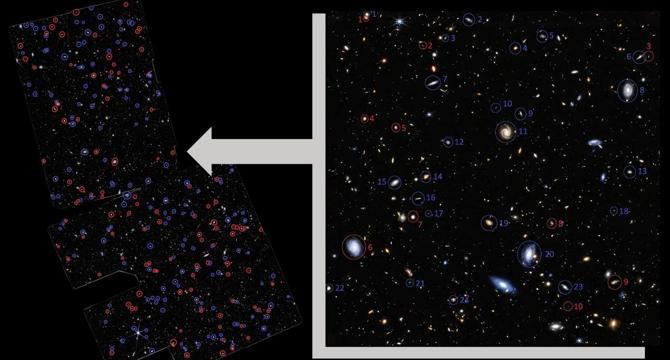Livescience
4w
147

Image Credit: Livescience
Is our universe trapped inside a black hole? This James Webb Space Telescope discovery might blow your mind
- The James Webb Space Telescope (JWST) has discovered that a majority of early galaxies in deep space are rotating in the same direction, hinting at a potential profound connection to the birth of the universe.
- This discovery challenges the expectation of random galactic rotation and suggests a preferred direction for the rotation of galaxies, raising questions about the origins of the universe.
- The findings from the JWST Advanced Deep Extragalactic Survey indicate a strange coordination in the rotation of 263 galaxies, leading to speculation about the universe being born in a rotating state, possibly within a black hole.
- Black hole cosmology proposes that our observable universe could be nested inside a black hole within a larger parent universe, presenting the idea that each black hole could potentially be a gateway to a new universe.
- Polish theoretical physicist Nikodem Poplawski's theory suggests that the singularity within black holes undergoes a bounce, leading to the creation of expanding universes, explaining the Big Bang and cosmic inflation.
- According to Poplawski's theory, each black hole could link to a new universe through a wormhole, potentially indicating that our universe is within a black hole from another universe.
- The observed coordinated rotations of galaxies by the JWST align with the concept of universes originating from rotating black holes, supporting the idea of black holes creating new universes.
- The possibility of a preferred axis in the universe could be explained by a universe born within a rotating black hole, influencing galactic rotation dynamics in alignment with the black hole's axis of rotation.
- The JWST's findings challenge previous assumptions and may require a re-evaluation of distance measurements in cosmology to account for the impact of the Milky Way's rotation on observations, potentially shedding new light on cosmological mysteries.
- This research was published in the Monthly Notices of the Royal Astronomical Society and raises intriguing possibilities about the interconnectedness of black holes, galactic rotations, and the fundamental nature of our universe.
Read Full Article
8 Likes
For uninterrupted reading, download the app